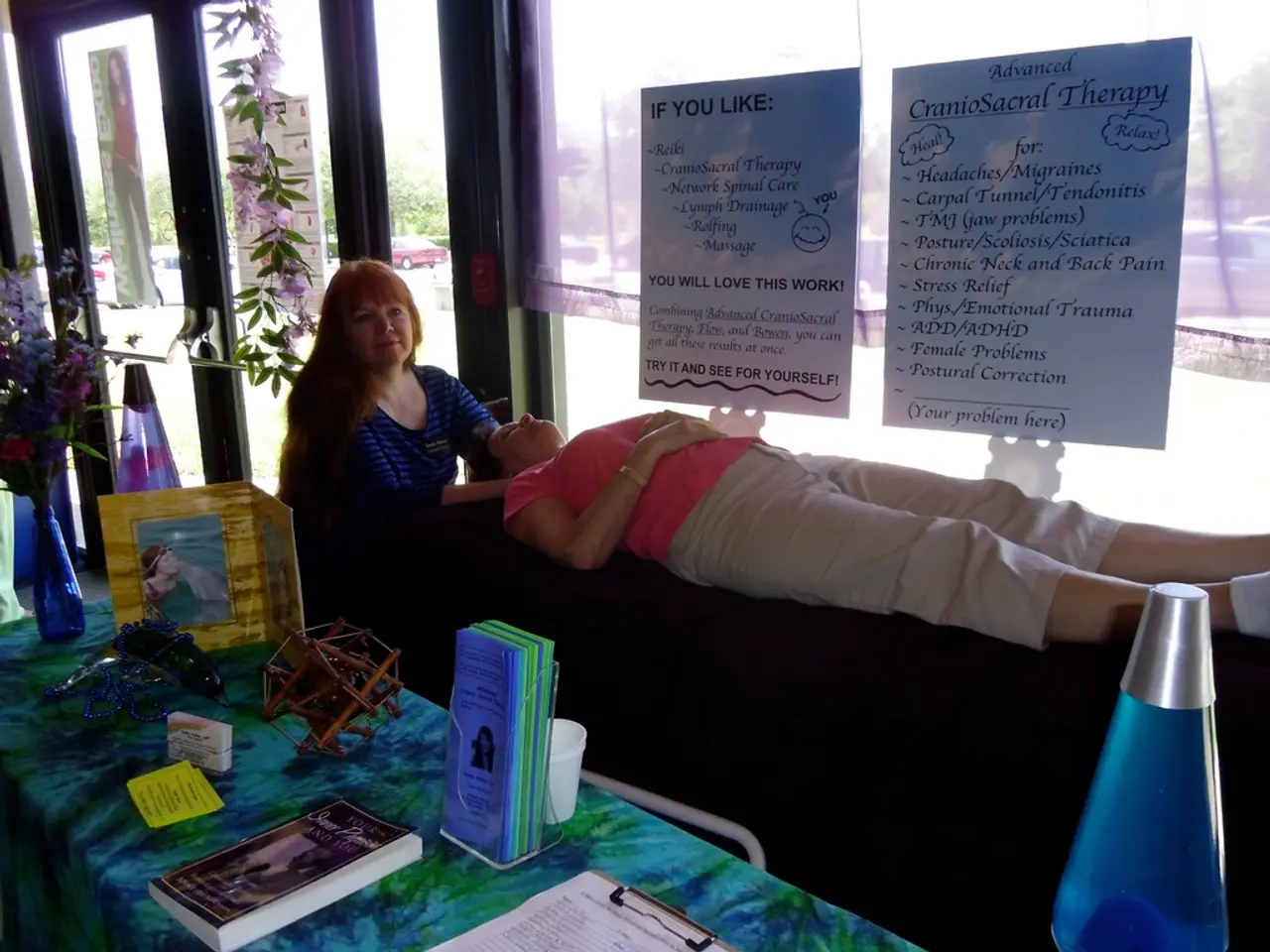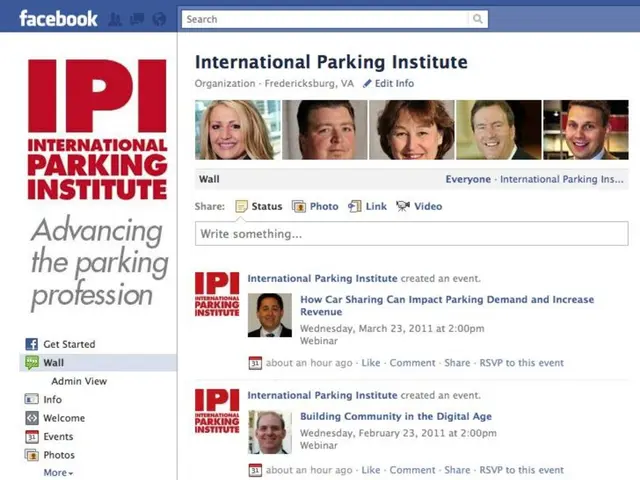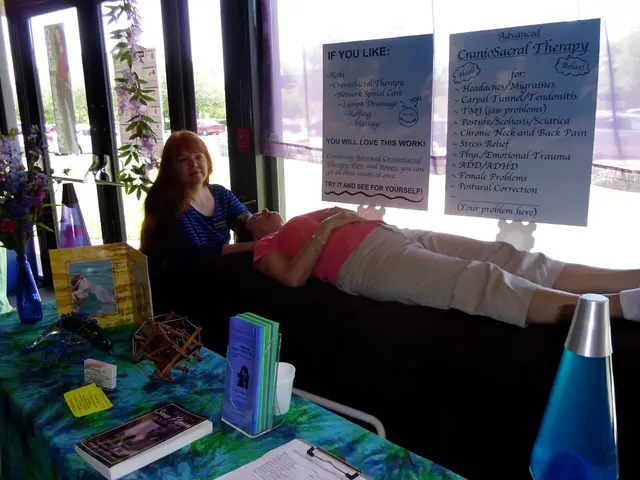Strategies for Handling Work-Related Stress: A Look at Some Options and Aids
In today's fast-paced work environment, stress is an inevitable part of many people's lives. The American Psychological Association (APA) reports that a majority of Americans consider their job to be a significant source of stress. However, it's essential to manage this stress effectively to prevent burnout and maintain a healthy work-life balance.
This article explores various relaxation techniques that can help manage chronic work-related stress. These methods, such as deep breathing exercises, meditation and mindfulness practices, aromatherapy, physical activity, and progressive muscle relaxation, help to calm the nervous system, reduce tension, and improve emotional regulation.
Deep Breathing Techniques
Deep breathing exercises, like diaphragmatic breathing and the 4-7-8 breath technique, involve slow, deep breaths from the abdomen to lower heart rate and blood pressure. The 4-7-8 breath technique, in particular, combines breath-holding and slow exhalation to induce relaxation.
Diaphragmatic Breathing
To perform diaphragmatic breathing, one lies on a flat surface, places a hand on the middle of the upper chest, places the other hand on the belly, inhales slowly through the nose while the stomach expands upward against the hand, and exhales by contracting the stomach muscles and allowing them to fall downward while keeping the chest still.
The 4-7-8 Breath Technique
The 4-7-8 breath technique is another deep breathing exercise that can help manage stress. To perform this technique, inhale for a count of four, hold your breath for a count of seven, and exhale for a count of eight.
Meditation and Mindfulness
Brief daily meditation (even 10 minutes) focusing on breath awareness can reduce perceived stress, improve job satisfaction, and boost engagement. Mindfulness interrupts automatic stress responses by promoting present-moment awareness.
Aromatherapy
Using scents like lavender or peppermint via diffusers or sprays can evoke relaxation and refreshment during work breaks.
Physical Activity
Quick, desk-friendly exercises or walks support physical health and reduce stress. Regular movement improves overall well-being and resilience against stress.
Progressive Muscle Relaxation
Systematically tensing and relaxing muscle groups reduces physical tension related to stress and can be practiced discreetly at work.
Additional Practical Strategies
Taking short breaks for fresh air, socializing with supportive colleagues or loved ones, maintaining a healthy work-life balance through hobbies and self-care routines, and organizing your workspace to reduce anxiety triggers can also help manage stress.
Incorporating these relaxation techniques consistently can help manage chronic work-related stress effectively within the workday and beyond. If someone feels apprehensive about discussing certain topics with their manager, they can reach out to their company's HR department for help.
Chronic stress can have a profound effect on a person's physical and mental health. Symptoms of stress, according to the APA, include muscle tension, headaches, body aches and pains, difficulty concentrating, low energy or fatigue, irritability or short temper, digestive issues, increased heart rate, sleeping difficulty, decrease in libido, weakening of the immune system, and experiencing illnesses more often.
It is recommended to repeat deep breathing exercises for 5-10 minutes each time for around 3-4 times per day. Taking a vacation, whether it's a trip out of town or staying at home, can help a person unwind and relax, having a re-setting effect.
If someone believes they are experiencing chronic stress, they should speak with a healthcare professional. A doctor may refer a person to a mental health professional or help them identify sources of stress in their life and manage these stressors accordingly. There are also many other ways to reduce and manage stress, such as getting the right amount of sleep, engaging in regular physical activity, and maintaining a strong social support network of family and friends.
[1] Hafner, U., & Schonfelder, S. (2014). Effects of Mindfulness-Based Stress Reduction on Telomere Length: A Systematic Review. Journal of Psychosomatic Research, 77(2), 129-135.
[2] Irwin, M. R., & Cole, S. W. (2011). Mindfulness-Based Stress Reduction and Stress Reduction Therapy: Effects on Immune Function. Psychosomatic Medicine, 73(4), 386-392.
[3] Jha, A. P., Krompinger, J., & Baime, M. J. (2007). Mindfulness Training Alters Brain and Immune Function. Psychosomatic Medicine, 69(4), 491-497.
[4] Lengacher, C., Cramer, H., & Dobos, G. (2016). The Effects of Yoga and Breathing Exercises on Stress and Stress-Related Parameters: A Systematic Review and Meta-Analysis. Journal of Psychosomatic Research, 90, 38-48.
[5] Peng, C. K., & Chang, Y. H. (2007). Effects of Mindfulness Meditation on Executive Functions in Older Adults: A Systematic Review. Mindfulness, 1(1), 39-48.
Deep breathing exercises like diaphragmatic breathing and the 4-7-8 breath technique, as part of a health-and-wellness routine, are scientifically proven to help manage chronic work-related stress by reducing tension, lowering heart rate, and improving emotional regulation. In addition, incorporating meditation and mindfulness practices, aromatherapy, physical activity, progressive muscle relaxation, and employing practical strategies such as taking short breaks, socializing, maintaining a healthy work-life balance, and organizing workspaces can further contribute to workplace-wellness and mental health.




